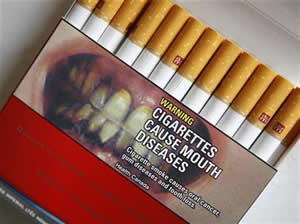Smoking causes lung cancer. We’ve known that for 60+ years. But the regulation of tobacco has happened in slow motion, thanks largely to political lobbying by the tobacco industry. In 2000, the Supreme Court ruled that the FDA could not take it upon itself to regulate cigarettes. It would first need legislative approval from Congress.
With President Bush gone, Congress should finally be voting on FDA regulation of tobacco in 2009. The proposed bill, called the Family Smoking Prevention and Tobacco Control Act, was introduced in February 2007 by that health and energy hero, Rep. Henry Waxman. The bill has been out of committee since April 2008. As I mentioned, these things happen slowly.
 The proposed bill strengthens restrictions on advertising and youth marketing, and it requires new, stronger warning labels. The Canadians have graphic illustrations of smoking-related diseases directly on a pack of cigarettes. Here’s a whole page of Canadian warning labels. The Canadian graphics are mild compared to the Brazilian warning poster that shows a gruesome case of smoking-related gangrene. The U.S. tobacco bill would presumably usher in Canadian-like labels. It also requires full disclosure of all ingredients in tobacco products and restricts harmful additives.
The proposed bill strengthens restrictions on advertising and youth marketing, and it requires new, stronger warning labels. The Canadians have graphic illustrations of smoking-related diseases directly on a pack of cigarettes. Here’s a whole page of Canadian warning labels. The Canadian graphics are mild compared to the Brazilian warning poster that shows a gruesome case of smoking-related gangrene. The U.S. tobacco bill would presumably usher in Canadian-like labels. It also requires full disclosure of all ingredients in tobacco products and restricts harmful additives.
After fighting tooth and nail for decades, the tobacco industry didn’t simply roll over and play dead. What they get in return is that the FDA cannot ban tobacco sales and must allow nicotine as an ingredient in tobacco products. The FDA can monitor the nicotine in cigarettes and is allowed to require lower nicotine levels in the future. This is true only for products consumed in the U.S., of course. The rest of the world will need to come up with its own legislation.
The big players in the tobacco industry are divided in their support of this bill. Philip Morris, now known domestically as Altria (doesn’t that sound innocent?), favors the bill. The major tobacco firms are vigorously opposed. Altria (think: Marlboro) currently has a 51 percent share of the American cigarette industry. Critics skeptical of the bill’s effectiveness have dubbed it the “Marlboro Monopoly Act.”
At home and abroad
Allan M. Brandt has a brief, informative article on all this in The New England Journal of Medicine (NEJM). Brandt, a historian of medicine at Harvard and an expert on the tobacco industry, has written a 600-page book on the history of cigarette smoking. Some excerpts from the article:
Using a combination of scientific misinformation, intensive political lobbying, and a culturally resonant argument that smokers must take personal responsibility for harms they incur from its product, the tobacco industry has fought off all attempts to bring the manufacture, marketing, and sale of cigarettes under the authority of the FDA or any other federal agency. [emphasis added]
[Altria] has recently spun off the far more profitable Philip Morris International (PMI). Although Altria is working to maintain its dominant position in the substantial but considerably reduced U.S. market, PMI and the other tobacco companies well understand that future profits in the cigarette trade will come largely from sales abroad. As a result, the stabilization and “normalization” of what has come to be widely regarded as a rogue industry may offer considerable advantages as the market for tobacco products moves predominantly into the developing world. While Altria is promoting FDA regulation, PMI is test-marketing a new high-tar, high-nicotine cigarette in Southeast Asia.
The World Health Organization (WHO) estimates that in the past century, 100 million smokers died worldwide from smoking-related diseases, but 10 times as many (1 billion) are expected to die this century if current rates of smoking are merely maintained.
With a new president, things may be looking up for tobacco opponents, both internationally and domestically. The U.S. and Indonesia are the only two major countries that haven’t ratified the WHO’s international treaty called Framework Convention on Tobacco Control. The Bush administration opposed the requirement that warning labels be written in the language of the country where the products were sold. They also opposed the treaty’s ban on misleading descriptions, such as “low-tar” or “ultra-light.” There’s a general expectation that President Obama will propose ratifying the treaty.
As Brandt points out, Congressional legislation on tobacco can backfire. Warning labels on cigarette packages were not only weak and ineffective, but were secretly advocated by the tobacco industry. The warning labels allowed cigarette manufacturers to avoid lawsuits from consumers, since smokers had been warned. “Once tobacco products began to sport such labels, the industry repeatedly argued in litigation, with considerable success, that its product was preempted from liability by Congressional mandate.”
Once tobacco products are regulated by the FDA, will we see cigarettes advertised with the FDA seal of approval?
Sources:
(Hover over book titles for more info.)
Allan M. Brandt, FDA Regulation of Tobacco — Pitfalls and Possibilities, The New England Journal of Medicine, July 31, 2008, Vol. 359: 445-448, No. 5.
Allan M. Brandt, The Cigarette Century: The Rise, Fall, and Deadly Persistence of the Product That Defined America
David R. Hardy, When to Warn – Why – and How. 28-page internal document discussing the legal advantages for tobacco companies of warning labels on cigarette packaging.



Sorry, comments are closed for this post.